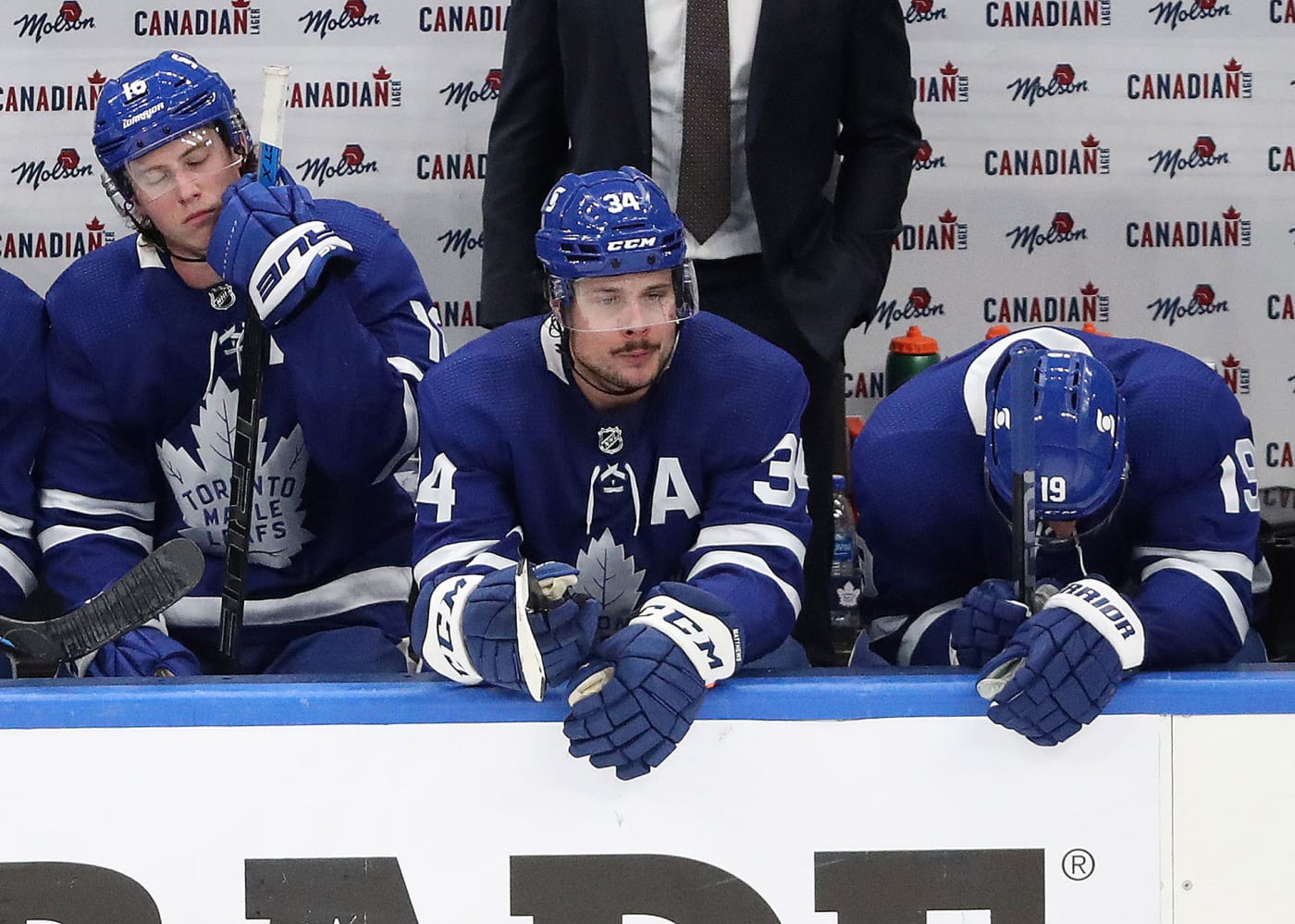It’s still hard to believe the manner in which this Toronto Maple Leafs season ended.
One week ago today, we were preparing for Game 5 with the Leafs up 3-1 and the Canadiens seemingly reeling. This one hurt different because these Leafs seemed so different — until they didn’t.
It’s far enough away now that perhaps I can sort through a collection of semi-coherent postmortem thoughts. Here are 10 of them.
1) Late in the series, when it got really hard, the Leafs‘ star players that played such huge minutes were not able to squeeze out those extra few drops in terms of their level of sacrifice and execution. We’re talking about the finest of margins here.
Even if he thought he was going into it, Mitch Marner was not entirely — not to the degree required — prepared to compete in the hard parts of the game that are uncomfortable for him. Anyone who didn’t see signs of Marner shrinking as the series wore on — conceding 50-50 battles, rushing/forcing plays, bobbling pucks — is not being honest about what took place. His inability to perform under great pressure played a significant role once the walls started closing in on him late in the series.
I
Where I stop short of the other full-throated criticisms: It’s not necessarily because of a lack of character or want, and it’s not necessarily true this will always remain the case. It’s that it hasn’t come to Marner as naturally and quickly as it did to a Jonathan Toews early in his NHL career, and you often don’t know where or how you’re falling short until you pay a real price for it.
Surrounding Marner and Matthews with the Thorntons, Simmonds, and Spezzas of the world was an intangible that seemed to be helping them both throughout the season, but as it turns out, it is no replacement for learned experience. They’ve now learned yet another hard lesson about what it actually takes in the playoffs to close a team out. They maybe thought they were all in at 100% this year, but they just got slapped with the cold-hard reality that they’re going to have to find an extra 10%.
That is a deeply unsatisfying answer for fans at the moment (even for me), but deep down, I think it’s probably true. Fans are right to be deeply upset it has taken this long. The Columbus series should’ve been all the lessons needed — it was rock bottom, basically. This was supposed to be different. It even looked completely different right up until Game 5 of the series.
Sometimes progress is far from linear, though.
2) What’s the solution when this is the case, if we really think about it? Restart from the beginning, and find new top-five-scoring star players who might learn about all of this sooner, or have a different makeup in terms of their innate level of aggression and ability to cope with the pressure? See you in five years — if that ever works out.
The Eichel – Marner speculation does give me some real food for thought. But there are not many deals out there that make a whole lot of sense.
3) It was notable to me how Brendan Shanahan went out of his way to defend the depth of the team.
I don’t think our depth was an issue. I think our depth actually played well all season long. I thought our depth was a benefit to us in the playoffs. That wasn’t an issue — not having the ability to go out and find players to surround them. We just didn’t get over that last hurdle. We didn’t get the job done.
I can’t speak for him, but I definitely think Shanahan was diplomatically communicating a similar sentiment as I argued in point #1 above if you read in between the lines of his presser. Similarly, this line from Kyle Dubas resonated: “The lessons are repeated until they are learned.”
The top line’s inability to break through was by far the most important factor in this series going south for me — full stop. When a star center goes down in John Tavares, Alex Kerfoot steps up down the middle of the ice with six points, William Nylander produces eight points, Alex Galchenyuk chips in four points, Jason Spezza chips in three goals and five points, Jake Muzzin has a two-goal game, and Morgan Rielly and TJ Brodie chip in a goal apiece, it should be enough support for the $22+ million duo to take this team over the hump against the Montreal Canadiens, who were scoring two goals a game in the series.
The contrast with the offensive studs of other high-seeded clubs is stark: nine points in four games for Nate MacKinnon, seven points in four games for Mikko Rantanen, 11 points in six games for Nikita Kucherov, eight points in six games for Steven Stamkos, 10 points in seven games for David Pastrnak, four goals in six games for Mark Stone, five goals in six games for Sebastian Aho, and four goals apiece for Patrice Bergeron and Brad Marchand.
This pretty much begins and ends with the one goal in seven games from $22 million worth of scoring talent that was playing an insane amount of minutes.
4) That said, it is hard to completely ignore what Corey Perry is doing in these playoffs and not contrast it with the fact that Wayne Simmonds wasn’t able to manufacture a moment or make much of a meaningful contribution in the playoffs. It’s said with a good deal of hindsight, but it’s his job to get these decisions right, and Dubas’ choice between the two players last offseason didn’t work out (he also paid double the price for Simmonds). Engvall and Mikheyev couldn’t create a key moment or generate a bit of unexpected offense, either, and Thornton had just the one moment of note in a Game 3 that was already well in hand for the Leafs.
It wouldn’t have been enough to tip a series the other way had the stars done their part, but it can’t be totally ignored that there was no offense of note from six of the seven players used in the bottom six.
The difficulty for Dubas is finding an additional quality role player or two that help drive play, are defensively responsible, can add to the room, and can break through when it counts. I am not sure if “clutchness” (or “killer instinct” — the word of the day yesterday) is a thing that can be acquired or not. You could hear Dubas literally debating this with himself in his season-ending presser.
5) It is a real concern that Jake Muzzin has been sidelined for critical playoff games two years in a row. Muzzin mentioned that he was chasing down a puck this time and something just “popped.” He has a lot of miles on his body and those have been hard miles compared to — just as a handy example — a Morgan Rielly when you account for how they skate and how they need to play in order to be effective.
This is no statement of concern about the quality of his play or person, though, which was again excellent all season. Muzzin is clearly one of the players on this team who understands winning in this league and knows how to flip the switch. His two-goal Game 5 was heroic.
They really needed him in Game 5 vs. Columbus and Game 7 vs. Montreal. It’s events like the Muzzin injuries, plus the Tavares freak accident, that make it hard to ignore this team’s hauntedness. You just hope you get an opportunity to see Muzzin healthy for a full run at some point.
6) Similar injury concerns apply to Zach Hyman, whose upcoming contract negotiation is another major offseason storyline. He had a monster regular season, continuing to demonstrate his evolution from a super-checker to a legitimate top-of-the-roster forward on any NHL team who can both score and create like a top-six offensive player.
All of that said, he has five points in his last 19 playoff games (two goals). Mostly, I think it’s a byproduct of some combination of various injuries (either playing through them or returning from them just in time for playoffs), a low on-ice shooting percentage, strength of competition, and his more offensively-talented linemates struggling to score (see: the on-ice shooting percentage point).
There is part of me that wonders if Hyman’s peerless motor that is so consistent night after night in the regular season (when not everyone is always going full speed like he is) doesn’t separate or shine quite as bright in the playoffs when everyone is battling at Zach Hyman regular-season levels. I am kind of surprised we didn’t have a few more big Zach Hyman moments in either the Columbus or Montreal series.
7) On the Mitch Marner power-play report, I think Elliotte Friedman made a good point on the MLHS podcast about there maybe being quite a bit of nuance to the situation (was it more about comfort/preference than an outright refusal, was there an element of tip-toeing around strong-willed and highly-paid/respected players? etc.).
But I will say this, and I thought this before this Marner controversy: Either some form of internal politics was playing a role with the stubbornness around the roles (Thornton’s and Marner’s, in particular) that led to the incessant predictability, or someone associated with the power play on the coaching staff genuinely thought there was no issue, it would work itself out in time, and in the process, allowed the man advantage to play a major part in derailing the team’s Cup chances — in a season that represented the organization’s best shot at a Cup since the Mats Sundin era (given the team’s overall play and path through the playoffs). One of these has to be true, and the latter is a borderline fireable offense.
8) The buck stops with Sheldon Keefe there, too. Even if Manny Malhotra was willing to die on the “the Marner glued to the half-wall, Thornton in the bumper” hill, I won’t accept throwing an assistant under the bus for this level of ineptitude. A head coach has to step in and sort it out once it reaches a clear crisis point, as it did from March 3 onward — and I’d imagine Keefe did step in but ultimately failed to rectify the situation. If it’s that he couldn’t muster up the courage to sit Marner down or move him into an entirely different role, he can’t be afraid of his best players or his most respected veterans (in Joe’s case).
I am also not sure how you go a full 56 games without playing Nylander with Matthews and Hyman for a game or two at any point — in a division the Leafs more or less ran away with, no less — which left Keefe feeling as though he had to ride the horse that got him there even when the duo was out of ideas in Game 6 & 7. When Marner was given the night off in the final game of the season, it was Adam Brooks who went up next to Matthews in his place.
9) The other theme that emerged from the year-end pressers — from Dubas and Keefe, in particular — was the idea that the Leafs became suddenly cautious when the series was on the line as opposed to going out and asserting themselves on the opposition. The starts of Games 5, 6, and 7 were mystifying for this reason.
This is the same refrain we heard about the Columbus series as well — and yet, in this case, they should have had loads of confidence after their regular-season success, performance through four playoff games, and track record of beating up on this Habs team literally all season long. As a coaching staff, why they couldn’t get this group refocused on the game plan that led to success all year long and in three successive playoff games is legitimately concerning.
10) It certainly feels this way now, but it would be a shame if the way this season ended made it impossible for any of us to fondly reflect on just how special the record-setting accomplishments of Auston Matthews and Jack Campbell were this season.
We all know Matthews’ deal, but Campbell’s emergence could be particularly big: If they have actually upgraded their goaltending at the starter’s position in 2021-22 over what they entered 2020-21 with, and are spending over $3 million less on their number one ($1.65 million next season for Campbell), it makes Dubas’ life easier when tackling other areas of the roster. (Side note: Hopefully, Zach Bogosian’s return is a part of this equation. He is everything you want in a bottom-pairing veteran who can partner with a young, skilled puck-mover).
The combination of the incredible season Campbell had, the new-goalie smell, and the heart-on-the-sleeve personality probably all contributed to him receiving more of a pass than Andersen would’ve received for the Gallagher 1-0 goal in Game 7, but for me, it’s Game 6 that should be remembered — in a closeout opportunity on the road, Campbell was their best player by far and the only reason the comeback in regulation was able to happen. He more than did his part.














![John Gruden after the Leafs prospects’ 4-1 win over Montreal: “[Vyacheslav Peksa] looked really comfortable in the net… We wouldn’t have won without him” John Gruden, head coach of the Toronto Marlies](https://mapleleafshotstove.com/wp-content/uploads/2025/09/gruden-post-game-sep-14-218x150.jpg)


















